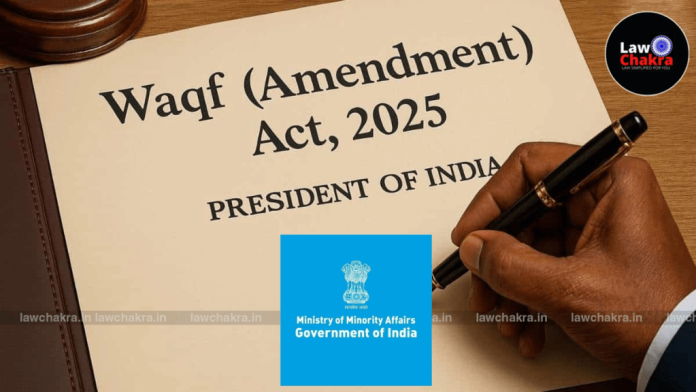New Delhi,: The Union Government has officially notified the “Unified Waqf Management, Empowerment, Efficiency and Development Rules, 2025” on July 3. These new rules, notified under the amended Waqf Act, aim to streamline the management of Waqf properties through a centralized portal and database, while also regulating registration, auditing, and maintenance of records, reported the Livelaw.
The Waqf Rules 2025 have been framed under Section 108B of the Waqf (Amendment) Act, 2025, which came into effect on April 8, 2025. This section authorizes the Central Government to formulate rules for the registration, audit, and efficient management of Waqf assets, including provisions for the welfare of widows, divorced women, and orphans.
Key Highlights:
Digital Portal & Unique ID:
A centralized portal and database will be created, supervised by the Joint Secretary of the Ministry of Minority Affairs in charge of the Waqf Division. Every Waqf property and Waqf institution will be assigned a unique identification number for tracking and record-keeping across states.
State-Level Implementation:
Each state must appoint a nodal officer (minimum rank: Joint Secretary) and establish a Centralized Support Unit, in consultation with the Centre, to assist with data uploading, registration, audit, and related functions of the Waqf Boards.
Mutawalli Registration:
Every Mutawalli (manager of Waqf) is required to register on the portal using a mobile number and email, verified through a one-time password (OTP). They must upload full details of their Waqf and related properties.
Survey and Publication of Auqaf:
State governments, upon completing the Waqf property survey, must publish a list of auqaf (plural of Waqf) containing details such as property boundaries, usage, occupants, creation details, current Mutawalli, and management. This list must then be uploaded on the portal within 90 days of publication in the official gazette.
New Waqf Registrations:
Any Waqf created after the enforcement of the Amendment Act must apply for registration with the Waqf Board within three months of its establishment.
Social Welfare Provision:
The rules also lay down procedures for providing financial assistance to widows, divorced women, and orphans from Waqf resources.
Audit and Record-Keeping:
Detailed guidelines have been issued for the keeping of accounts, auditing, and maintaining official registers of Waqf Boards and properties.
Meanwhile, the Supreme Court has reserved its order on multiple petitions seeking a stay on the operation of the Waqf (Amendment) Act, 2025.




